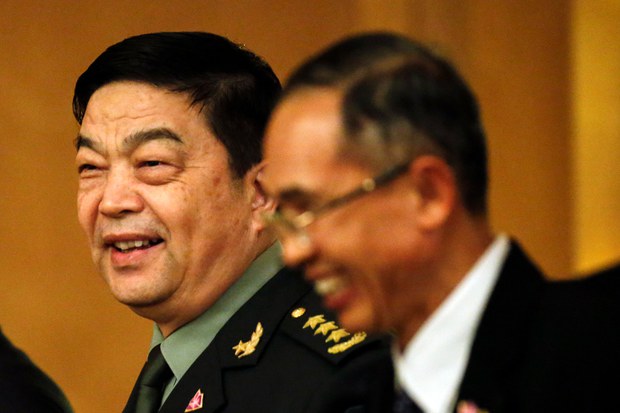ASEAN, China Plan First Joint Naval Training in 2018
2018.02.09
Manila
 China Defense Minister Gen. Chang Wanquan, left, attends the ASEAN-China Defense Ministers Meeting in Singapore, Feb. 6, 2018.
China Defense Minister Gen. Chang Wanquan, left, attends the ASEAN-China Defense Ministers Meeting in Singapore, Feb. 6, 2018.
China and the Association of Southeast Asian Nations (ASEAN) plan to hold maritime drills later this year in a move that security analysts said could be Beijing’s way of consolidating power as it moves forward with militarization efforts in the South China Sea.
The two sides announced the agreement earlier this week in Singapore, which hosted defense ministers from the region and Chinese Gen. Chang Wanquan.
While all parties agreed that terrorism remained a key challenge in the region, participants reaffirmed the importance of coming up with a code to prevent unplanned encounters in the sea and air, a joint statement said.
“In particular, the ministers discussed ways to improve practical cooperation and welcomed the conduct of an inaugural ASEAN-China Maritime Exercise at the end of this year,” the statement said without announcing a date for the drills.
Sources said tabletop exercises could take place some time in October, followed by naval exercises involving one of the 10 ASEAN nations later in the year.
The Philippines, which hosted ASEAN meetings last year and appears to have improving ties with Beijing, could be tapped for the inaugural drills, according to a foreign department source who requested anonymity.
Beijing proposed drills three years ago, but some ASEAN members had expressed apprehension because of rising tensions in the South China Sea.
China claims much of the region while rival Taiwan and ASEAN countries Brunei, Malaysia, the Philippine and Vietnam have their own stakes in the South China. In 2016, the Hague-Based Permanent Court of Arbitration ruled in favor of the Philippines in its challenge to China’s efforts in the region.
China has rejected the ruling and continues to expand structures including landing strips on islands it has claimed.
One of President Rodrigo Duterte’s first official acts after taking office in June 2016 was a state visit to Beijing in what was seen as a gesture to improve relations with the regional giant.
Hegemony
On Friday, Richard Javad Heydarian, a political analyst at Manila’s De La Salle University, said China was moving toward appeasing the South China Sea claimants even as it continued with its vast expansion.
“Clearly the Chinese strategy is to seek and secure acquiescence of ASEAN through confidence-building measures and non-ending talks on the Code of Conduct – with most Southeast Asian countries including the Philippines embracing strategic fatalism amid China’s emerging hegemony,” he told BenarNews.
China, Heydarian said, was banking on its overwhelming military supremacy over smaller Southeast Asian states who could gain massive economic benefits if they dropped their antagonistic stance.
“Clearly, it’s working wonders in Duterte’s Philippines,” he said, referring to millions of dollars in pledges and contracts from the Chinese side.
“In China’s view, domination of that area is key to keeping America’s naval prowess and footprint in adjacent waters in check,” he said.
Benham Rise
Duterte recently demanded a stop to all foreign explorations in the Benham Rise, a mineral-rich undersea region in the Pacific Ocean after learning that a Chinese research vessel was granted access.
The Philippines recently laid claim to the region, where it has been carrying out research studies to map out its resources.
Heydarian said that apart from the area having major aquatic and mineral resources, gaining access and control there could be key for China to monitor American submarine movements.
“They want to protect their burgeoning submarine capacity, which is still vulnerable to western and Japanese technology,” he said.
Roilo Golez, the country’s ex-national security adviser, urged the government to closely guard the Benham Rise, noting that Beijing was scouting for new sources of energy to power its economy forward.
He warned that Chinese submarines could travel to the area undetected “constituting a threat to the security of the Philippines and our allies in the western Pacific.”







